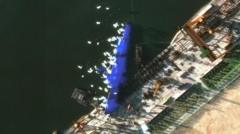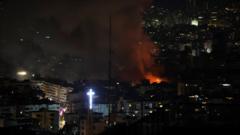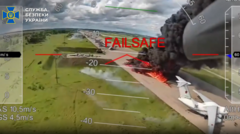Israel's recent airstrikes on the southern suburbs of Beirut have raised alarms, especially as they occurred just before the significant Islamic holiday Eid Al Adha. The Israeli government has stated the attacks targeted Hezbollah drone facilities, igniting local condemnation and renewed fears among Lebanese citizens.
Israel Strikes Beirut on Eve of Eid Al Adha: Tensions Rise Further

Israel Strikes Beirut on Eve of Eid Al Adha: Tensions Rise Further
Israeli airstrikes in southern Beirut heighten tensions as Eid Al Adha approaches.
In the night strike, Israel's Defense Forces (IDF) claimed they were targeting a Hezbollah unit allegedly producing "thousands" of drones underground with funding from Iranian sources. The attack came despite a six-month ceasefire between Israel and Hezbollah, leading Lebanese Prime Minister Nawaf Salam to issue a strong condemnation, denouncing it as a systematic strike against Lebanese sovereignty and public safety during a sensitive time.
The airstrikes prompted mass evacuations as warnings were issued for buildings in the densely populated Dahieh area, triggering a chaotic exodus and traffic jams. Lebanese President Joseph Aoun characterized the strikes as a "flagrant violation of an international accord" and an act of provocation just before a major religious festival.
The Office of the United Nations Special Coordinator for Lebanon noted the strikes resulted in anxiety among the local population, highlighting the necessity for diplomatic solutions to de-escalate tension between Israel and Hezbollah. Israel's Defence Minister Israel Katz defended the military operation, asserting that the Lebanese government must be held accountable for any violations stemming from Hezbollah's activities.
Before the airstrikes, an Israeli military spokesman specifically ordered evacuations in Hadath, Haret Hreik, and Borj el-Barajneh areas, stressing the presence of Hezbollah infrastructure. The recent strikes are part of a broader context of ongoing conflict and military actions between Israel and Hezbollah, including prior attacks linked to Hezbollah's military capabilities.
This latest military engagement follows a prolonged conflict that intensified from 2023 to 2024, killed thousands in Lebanon, and led to significant displacement. Although a ceasefire was established, Lebanon accuses Israel of ongoing violations, raising questions about the longevity of the truce and future stability in the region.
The airstrikes prompted mass evacuations as warnings were issued for buildings in the densely populated Dahieh area, triggering a chaotic exodus and traffic jams. Lebanese President Joseph Aoun characterized the strikes as a "flagrant violation of an international accord" and an act of provocation just before a major religious festival.
The Office of the United Nations Special Coordinator for Lebanon noted the strikes resulted in anxiety among the local population, highlighting the necessity for diplomatic solutions to de-escalate tension between Israel and Hezbollah. Israel's Defence Minister Israel Katz defended the military operation, asserting that the Lebanese government must be held accountable for any violations stemming from Hezbollah's activities.
Before the airstrikes, an Israeli military spokesman specifically ordered evacuations in Hadath, Haret Hreik, and Borj el-Barajneh areas, stressing the presence of Hezbollah infrastructure. The recent strikes are part of a broader context of ongoing conflict and military actions between Israel and Hezbollah, including prior attacks linked to Hezbollah's military capabilities.
This latest military engagement follows a prolonged conflict that intensified from 2023 to 2024, killed thousands in Lebanon, and led to significant displacement. Although a ceasefire was established, Lebanon accuses Israel of ongoing violations, raising questions about the longevity of the truce and future stability in the region.




















